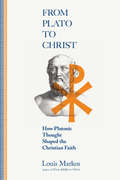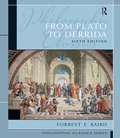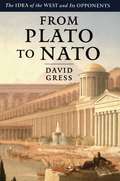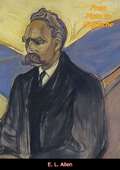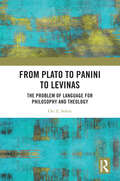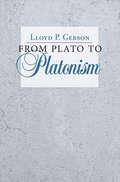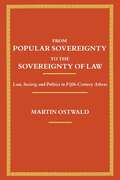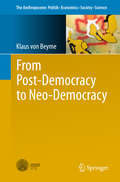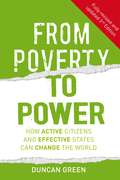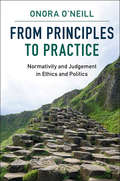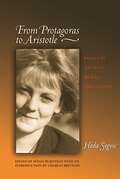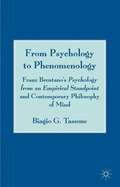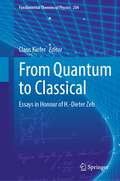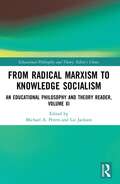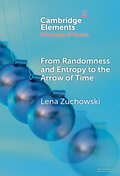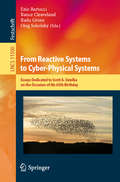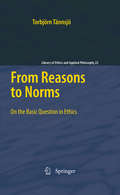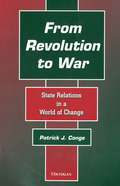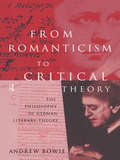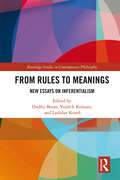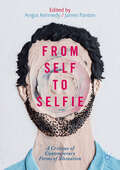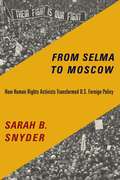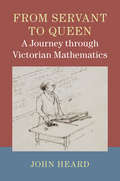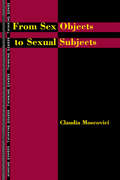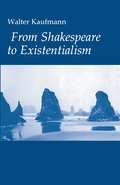- Table View
- List View
From Plato to Christ: How Platonic Thought Shaped the Christian Faith
by Louis MarkosWhat does Plato have to do with the Christian faith? Quite a bit, it turns out. In ways that might surprise us, Christians throughout the history of the church and even today have inherited aspects of the ancient Greek philosophy of Plato, who was both Socrates's student and Aristotle's teacher. To help us understand the influence of Platonic thought on the Christian faith, Louis Markos offers careful readings of some of Plato's best-known texts and then traces the ways that his work shaped the faith of some of Christianity's most beloved theologians, including Gregory of Nyssa, Augustine, Dante, and C. S. Lewis. With Markos's guidance, readers can ascend to a true understanding of Plato's influence on the faith.
From Plato to Derrida (Philosophic Classics #Sixth Edition)
by Forrest E. BairdFirst published in 1961, Forrest E. Baird's revision of Philosophic Classics continues the tradition of providing generations of students with high quality course material. Using the complete works, or where appropriate, complete sections of works, this anthology allows philosophers to speak directly to students. <P><P>Esteemed for providing the best available translations, Philosophic Classics: From Plato to Derrida, features complete works or complete sections of the most important works by the major thinkers, as well as shorter samples from transitional thinkers.
From Plato to NATO
by David GressAn in-depth intellectual history of the Western idea and a passionate defense of its importance to America's future, From Plato to NATO is the first book to make sense of the legacy of the West at a time when it is facing its greatest challenges. Readers of Francis Fukuyama, John Gray, Samuel Huntington, and other analysts of the dilemmas of Western nations in the twenty-first century will find in David Gress's original account a fuller description of what the West really is and how, with the best of intentions, it has been misrepresented. Most important, they will encounter a new vision of Western identity and how it can be recovered. Early in the twentieth century, American educators put together a story of Western civilization, its origins, history, and promise that for the subsequent fifty years remained at the heart of American college education. The story they told was of a Western civilization that began with the Greeks and continued through 2,500 years of great books and great ideas, culminating in twentieth-century progressive liberal democracy, science, and capitalist prosperity. In the 1960s, this Grand Narrative of the West came under attack. Over the next thirty years, the critics turned this old story into its opposite: a series of anti-narratives about the evils, the failures, and the betrayals of justice that, so they said, constituted Western history. The victory of Western values at the end of the cold war, the spread of democracy and capitalism, and the worldwide impact of American popular culture have not revived the Grand Narrative in the European and American heartlands of the West. David Gress explains this paradox, arguing that the Grand Narrative of the West was flawed from the beginning: that the West did not begin in Greece and that, in morality and religion, the Greeks were an alien civilization whose contribution was mediated through Rome and Christianity. Furthermore, in assuming a continuity from the Greeks to modern liberalism, we have mistakenly downplayed or rejected everything in between, focusing on the great ideas and the great books rather than on real history with all its ambiguities, conflicts, and contradictions. The heart of Gress's case for the future of the West is that the New must remember its roots in the Old and seek a synthesis. For as the attacks have demonstrated, the New West cannot stand alone. Its very virtues -- liberty, reason, progress -- grew out of the Old West and cannot flourish when removed from that rich soil.
From Plato to Nietzsche
by E. L. AllenIDEAS THAT SHAPE OUR LIVESThis book is a clear, comprehensive guide to the philosophic and religious concepts of the world’s outstanding philosophers.Here are the great thoughts and ideas of the Western mind, selected and explained with magnificent precision by an eminent scholar.It is an illuminating portrait of man’s intellectual and moral struggle to understand the world and the meaning of human life and destiny.“Any intelligent student will have his appetite whetted by a study or perusal of this book.”—HIGHER EDUCATION JOURNAL
From Plato to Panini to Levinas: The Problem of Language for Philosophy and Theology
by Ori Z SoltesThis volume offers an innovative exploration of Western social and religious thought and bridges the expression of a regional imagination with several planetary conversations. It reconnects Plato and philosophy to the issue of theology and religion and the limits of language as an instrument in engaging both disciplines. While beginning with the language problem as Socrates lays it out in Plato’s Cratylus, it wends its way through the Panini-inspired discussion of language across Western thought and turns to an examination of the idea of theodicy—the justice of God in its relationship to humans: how do the innocent suffer—for example, during the Holocaust—in a world made by God? The book ultimately turns arouand to consider how particular contemporary Indian thinkers have taken up both Western thought and the issue of language and its applicability to philosophy and theology. It thus offers new horizons in the Western World and India by connecting Plato’s Cratylus to the works of Saussure, Wittgenstein, Barthes, Derrida, Levinas, as well as to Panini, Aurobindo, Ranjan Dass, Giri, and the Gita. The volume will be of great interest to scholars and researchers of philosophy, linguistics, and religion.
From Plato to Platonism
by Lloyd P. GersonWas Plato a Platonist? While ancient disciples of Plato would have answered this question in the affirmative, modern scholars have generally denied that Plato’s own philosophy was in substantial agreement with that of the Platonists of succeeding centuries. In From Plato to Platonism, Lloyd P. Gerson argues that the ancients are correct in their assessment. He arrives at this conclusion in an especially ingenious manner, challenging fundamental assumptions about how Plato’s teachings have come to be understood. Through deft readings of the philosophical principles found in Plato's dialogues and in the Platonic tradition beginning with Aristotle, he shows that Platonism, broadly conceived, is the polar opposite of naturalism and that the history of philosophy from Plato until the seventeenth century was the history of various efforts to find the most consistent and complete version of "anti-naturalism." Gerson contends that the philosophical position of Plato—Plato’s own Platonism, so to speak—was produced out of a matrix he calls "Ur-Platonism." According to Gerson, Ur-Platonism is the conjunction of five "antis" that in total arrive at anti-naturalism: anti-nominalism, anti-mechanism, anti-materialism, anti-relativism, and anti-skepticism. Plato’s Platonism is an attempt to construct the most consistent and defensible positive system uniting the five "antis." It is also the system that all later Platonists throughout Antiquity attributed to Plato when countering attacks from critics including Peripatetics, Stoics, and Sceptics. In conclusion, Gerson shows that Late Antique philosophers such as Proclus were right in regarding Plotinus as "the great exegete of the Platonic revelation."
From Popular Sovereignty to the Sovereignty of Law: Law, Society, and Politics in Fifth-Century Athens
by Martin OstwaldAnalyzing the "democratic" features and institutions of the Athenian democracy in the fifth century B.C., Martin Ostwald traces their development from Solon's judicial reforms to the flowering of popular sovereignty, when the people assumed the right both to enact all legislation and to hold magistrates accountable for implementing what had been enacted.
From Post-democracy to Neo-Democracy (The Anthropocene: Politik—Economics—Society—Science #20)
by Klaus Von BeymeThis book of a renowned political scientist and specialist in political theory fundamentally challenges the new fashion of post-democracy by offering an outlook on ‘neo-democracy’. The political periods are similar to epochs in modern art, where ‘neo’ succeeded Post-impressionism and Post-expressionism. This book reviews the topical debate on postdemocracy and scenarios of decline in democratic theory without the alternative of dictatorship. It discusses criticism of politics in the old and new media and a new culture of protest. It addresses new forms of participation and the dangers of populism and right-wing extremism. It proposes institutional reforms of democracy, of the parliamentary system and the party state, in negotiations of coalition-building, in governmental declarations and for the policy output. The book concludes with a debate of normative models of democracy from ‘Post-democracy’ to ‘Neo-democracy’, models of justice and theories of democratic reform.
From Poverty to Power: How Active Citizens and Effective States Can Change the World (Second Edition)
by Duncan GreenThe book discusses different types of initiatives across the world that have enhanced and expanded the powers of the powerless and emphasizes how 'active citizenship' can be a very effective way of seeking solutions.
From Principles to Practice: Normativity and Judgement in Ethics and Politics
by Onora O'NeillKnowledge aims to fit the world, and action to change it. In this collection of essays, Onora O'Neill explores the relationship between these concepts and shows that principles are not enough for ethical thought or action: we also need to understand how practical judgement identifies ways of enacting them and of changing the way things are. Both ethical and technical judgement are supported, she contends, by bringing to bear multiple considerations, ranging from ethical principles to real-world constraints, and while we will never find practical algorithms - let alone ethical algorithms - that resolve moral and political issues, good practical judgement can bring abstract principles to bear in situations that call for action. Her essays thus challenge claims that all inquiry must use either the empirical methods of scientific inquiry or the interpretive methods of the humanities. They will appeal to a range of readers in moral and political philosophy.
From Protagoras to Aristotle: Essays in Ancient Moral Philosophy
by Heda SegvicThis is a collection of the late Heda Segvic's papers in ancient moral philosophy. At the time of her death at age forty-five in 2003, Segvic had already established herself as an important figure in ancient philosophy, making bold new arguments about the nature of Socratic intellectualism and the intellectual influences that shaped Aristotle's ideas. Segvic had been working for some time on a monograph on practical knowledge that would interpret Aristotle's ethical theory as a response to Protagoras. The essays collected here are those on which her reputation rests, including some that were intended to form the backbone of her projected monograph. The papers range from a literary study of Homer's influence on Plato's Protagoras to analytic studies of Aristotle's metaphysics and his ideas about deliberation. Most of the papers reflect directly or indirectly Segvic's idea that both Socrates' and Aristotle's universalism and objectivism in ethics could be traced back to their opposition to Protagorean relativism. The book represents the considerable achievements of one of the most talented scholars of ancient philosophy of her generation.
From Psychology to Phenomenology
by Biagio G. TassoneAlthough highly influential, Brentano's doctrines from Psychology from an Empirical Standpoint were taken up and changed by his students and subsequent thinkers. Tassone's study of this important text offers readers a better understanding of PES and outlines its ongoing relevance for contemporary philosophy of mind.
From Quantum to Classical: Essays in Honour of H.-Dieter Zeh (Fundamental Theories of Physics #204)
by Claus KieferQuantum theory is at the foundation of the physical description of our world. One of the people who contributed significantly to our conceptual understanding of this theory was Heinz-Dieter Zeh (1932-2018). He was the pioneer of the process of decoherence, through which the classical appearance of our world can be understood. This volume presents a collection of essays dedicated to his memory, written by distinguished scientists and scholars. They cover all aspects of the interpretation of quantum theory in general and the quantum-to-classical transition in particular. This volume provides illuminating reading to anyone seeking a deep understanding of quantum theory and its relevance to the foundations of physics.
From Radical Marxism to Knowledge Socialism: An Educational Philosophy and Theory Reader, Volume XI (Educational Philosophy and Theory: Editor’s Choice)
by Michael A. PetersThis volume examines the place of Marxist theory in the history of the journal Educational Philosophy and Theory, primarily through the selection and exploration of typical and significant articles exploring Marxist-related themes in the journal over time. The title, From Radical Marxism to Knowledge Socialism, reflects this historical approach. In the 1960s and 1970s, Marxism was considered to be a radical, extreme ‘political’ theory, while western liberalism and a free-market economy were largely taken for granted as natural phenomena, in western philosophy of education and in the journal. More recently, educational theorists have begun to explore trends related to the neoliberal age. Paradoxically, such trends include the move toward knowledge socialism, which decenters the normative presuppositions of knowledge capitalism as the latest iteration of western liberalism. The volume begins with an introductory chapter that examines the history of Marxism in western philosophy and philosophy of education. The rest of the book features works selected from the journal that further illustrate the evolution of Marxist theoretical perspectives in the field over time. This collection thus gives a sense of the range and extent of Marxist-inspired thinking in educational philosophy and theory. This book will be of interest to students and scholars of educational philosophy and theory and others who are interested in exploring in depth the evolution of key themes in this field over time, including liberalism, ideology, Marxism, neoliberalism, knowledge construction, capitalist and socialist schooling, and other aspects of economic analysis in education.
From Randomness and Entropy to the Arrow of Time (Elements in the Philosophy of Physics)
by Lena ZuchowskiThe Element reconstructs, analyses and compares different derivational routes to a grounding of the Arrow of Time in entropy. It also evaluates the link between entropy and visible disorder, and the related claim of an alignment of the Arrow of Time with a development from order to visible disorder. The Element identifies three different entropy-groundings for the Arrow of Time: (i) the Empirical Arrow of Time, (ii) the Universal Statistical Arrow of Time, and (iii) the Local Statistical Arrow of Time. The Element will also demonstrate that it is unlikely that high entropy states will always coincide with visible disorder. Therefore, it will dispute that there is a strong link between the Arrow of Time and visible disorder.
From Reactive Systems to Cyber-Physical Systems: Essays Dedicated to Scott A. Smolka on the Occasion of His 65th Birthday (Lecture Notes in Computer Science #11500)
by Ezio Bartocci Oleg Sokolsky Rance Cleaveland Radu GrosuThis Festschrift is in honor of Scott A. Smolka, Professor in the Stony Brook University, USA, on the occasion of his 65th birthday. Scott A. Smolka made fundamental research contributions in a number of areas, including process algebra, model checking, probabilistic processes, runtime verification, and the modeling and analysis of cardiac cells, neural circuits and flocking behaviors. He is perhaps best known for the algorithm he and Paris Kanellakis invented for checking bi-simulation. The title of this volume From Reactive Systems to Cyber-Physical Systems reflects Scott's main research focus throughout his career. It contains the papers written by his closest friends and collaborators. The contributions cover a wide spectrum of the topics related to Scott's research scientific interests, including model repair for probabilistic systems, runtime verification, model checking, cardiac dynamics simulation and machine learning.
From Reasons to Norms
by Torbjörn TännsjöThis book originated from a discussion between the author, Derek Parfit and Wlodek Rabinowicz, and further developed in correspondence and intense discussions with Wlodek Rabinowics and John Broome. The author disputes the recent trend in metaethics that focuses on reasons rather than norms. The reader is invited to take a new look at the traditional metaethical questions of moral semantics, ontology, and epistemology. The author mainly concerns himself with particular aspects of these problems: Which are the problems of morality? Are there many different moral questions, or, do they all, in the final analysis, reduce to one? The bold claim made in this book is that there is just one: What ought to be done? Moreover, there is just one source of normativity, just one kind of 'ought'-question, which lends itself to an objectively correct and authoritative answer.
From Revolution to War: State Relations in a World of Change
by Patrick J. CongeIn the history of international relations, few events command as much attention as revolution and war. Over the centuries, revolutionary transformations have produced some of the most ruinous and bloody wars. Nevertheless, the breakdown of peace in time of revolution is poorly understood. Patrick Conge offers a groundbreaking study of the relationship between war and revolution. How can we best understand the effect of revolutionary transformations on the politics of war and peace? Conge argues that it is only by bringing in, first, the organizational capacity of revolutionary regimes to extract resources and convert them into military strength and, second, the power of transformative ideas to transcend national boundaries and undermine the ability of opposing regimes to compromise that we are best able to understand the effect of revolution on the origins and persistence of war. By incorporating such key elements, this book provides a new, more comprehensive explanation of the relationship between revolution, war, and peace. Conditions that lead to and sustain wars in general are identified and placed in the light of revolutionary transformations. Once the argument is presented, historical case studies are used to test its plausibility. Conge demonstrates the importance of the effect of revolutionary organization and ideas on the outcome of conflicts. Political scientists, historians, sociologists, and the general reader interested in the politics of war and peace in revolutionary times are given new perspectives on the relationship between revolution and war as well as on the implications of political organization for military power and the process of consolidation of new regimes.
From Romanticism to Critical Theory: The Philosophy of German Literary Theory
by Andrew BowieFrom Romanticism to Critical Theory explores the philosophical origins of literary theory via the tradition of German philosophy that began with the Romantic reaction to Kant. It traces the continuation of the Romantic tradition of Novalis, Friedrich Schlegel and Schleiermacher, in Heidegger's approaches to art and thruth, and in the Critical Theory of Benjamin and Adorno.Andrew Bowie argues, against many current assumptions, that the key aspect of literary theory is not the demonstration of how meaning can be deconstructed, but rather the relevation of how questions of language and literature change modern philosophical conceptions of thruth. He shows how the dialogue between literary theory, hermeneutics and analytical philosophy can profit from a re-examination of the understanding of language, thruth and literature in modern German philosophy.From Romanticism to Critical Theory will provide a vital new introduction to central theoretical questions for students of philosophy, literature, German studies, cultural and social theory.
From Rules to Meanings: New Essays on Inferentialism (Routledge Studies in Contemporary Philosophy)
by Ondřej Beran Vojtěch Kolman Ladislav KoreňInferentialism is a philosophical approach premised on the claim that an item of language (or thought) acquires meaning (or content) in virtue of being embedded in an intricate set of social practices normatively governed by inferential rules. Inferentialism found its paradigmatic formulation in Robert Brandom’s landmark book Making it Explicit, and over the last two decades it has established itself as one of the leading research programs in the philosophy of language and the philosophy of logic. While Brandom’s version of inferentialism has received wide attention in the philosophical literature, thinkers friendly to inferentialism have proposed and developed new lines of inquiry that merit wider recognition and critical appraisal. From Rules to Meaning brings together new essays that systematically develop, compare, assess and critically react to some of the most pertinent recent trends in inferentialism. The book’s four thematic sections seek to apply inferentialism to a number of core issues, including the nature of meaning and content, reconstructing semantics, rule-oriented models and explanations of social practices and inferentialism’s historical influence and dialogue with other philosophical traditions. With contributions from a number of distinguished philosophers—including Robert Brandom and Jaroslav Peregrin—this volume is a major contribution to the philosophical literature on the foundations of logic and language.
From Self to Selfie: A Critique of Contemporary Forms of Alienation
by Angus Kennedy James PantonThis edited collection charts the rise and the fall of the self, from its emergence as an autonomous agent during the Enlightenment, to the modern-day selfie self, whose existence is realised only through continuous external validation. Tracing the trajectory of selfhood in its historical development - from the Reformation onwards - the authors introduce the classic liberal account of the self, based on ideas of freedom and autonomy, that dominated Enlightenment discourse. Subsequent chapters explore whether this traditional notion has been eclipsed by new, more rigid, categories of identity, that alienate the self from itself and its possibilities: what I am, it seems, has become more important than what I might make of myself. These changing dynamics of selfhood – the transition From Self to Selfie - reveal not only the peculiar ways in which selfhood is problematized in contemporary society, but equally the tragic fragility of the selfie, in the absence of any social authority that could give it some security.
From Selma to Moscow: How Human Rights Activists Transformed U.S. Foreign Policy
by Sarah B. SnyderThe 1960s marked a transformation of human rights activism in the United States. At a time of increased concern for the rights of their fellow citizens—civil and political rights, as well as the social and economic rights that Great Society programs sought to secure—many Americans saw inconsistencies between domestic and foreign policy and advocated for a new approach. The activism that arose from the upheavals of the 1960s fundamentally altered U.S. foreign policy—yet previous accounts have often overlooked its crucial role.In From Selma to Moscow, Sarah B. Snyder traces the influence of human rights activists and advances a new interpretation of U.S. foreign policy in the “long 1960s.” She shows how transnational connections and social movements spurred American activism that achieved legislation that curbed military and economic assistance to repressive governments, created institutions to monitor human rights around the world, and enshrined human rights in U.S. foreign policy making for years to come. Snyder analyzes how Americans responded to repression in the Soviet Union, racial discrimination in Southern Rhodesia, authoritarianism in South Korea, and coups in Greece and Chile. By highlighting the importance of nonstate and lower-level actors, Snyder shows how this activism established the networks and tactics critical to the institutionalization of human rights. A major work of international and transnational history, From Selma to Moscow reshapes our understanding of the role of human rights activism in transforming U.S. foreign policy in the 1960s and 1970s and highlights timely lessons for those seeking to promote a policy agenda resisted by the White House.
From Servant to Queen: A Journey through Victorian Mathematics
by John HeardWith a few notable exceptions, pure mathematics in Britain at the beginning of the nineteenth century was mainly a recreation for amateurs. Drawing on primary sources, John Heard provides an engaging account of the process by which it rose to become an academic discipline of repute which by the First World War was led by G. H. Hardy, and supported by the internationally-respected London Mathematical Society. In chronicling that rise, this book describes key contributions and the social environment in which mathematicians operated, using contemporary commentary where appropriate. No mathematical knowledge is required, and readers with a wide range of interests and backgrounds will find much to enjoy here. The material is presented from an impartial point of view, and provides full references to help any researchers who want to dig deeper into the original sources. The result is a unique insight into the world of Victorian mathematics and science.
From Sex Objects to Sexual Subjects (Thinking Gender Ser.)
by Claudia MoscoviciFrom Sex Objects to Sexual Subjects traces some of the ruptures and continuities between the eighteenth-century masculinist formulations of subjectivity elaborated by Rousseau, Diderot and Kant and the contemporary postmodern and feminist critiques of the universal subject--meaning the self viewed as an abstract individual who exercises an impartial and rational (political) judgment that is idential to other similarly defined individuals--developed by Luce Irigaray, Francois Lyotard, Jacques Derrida, Jurgen Habermas, Nancy Fraser, Judith Butler and Michel Foucault. In her work, Moscovici brings together the wide-ranging discussion of subjectivity with debates about public discourse. In so doing she attempts a synthesis between the two discussions that have recently engaged feminist theorists and others.
From Shakespeare to Existentialism: Essays on Shakespeare and Goethe; Hegel and Kierkegaard; Nietzsche, Rilke and Freud; Jaspers, Heidegger, and Toynbee
by Walter A. KaufmannA companion volume to his Critique of Religion and Philosophy, this book offers Walter Kaufmann's critical interpretations of some of the great minds in Western philosophy, religion, and literature.
